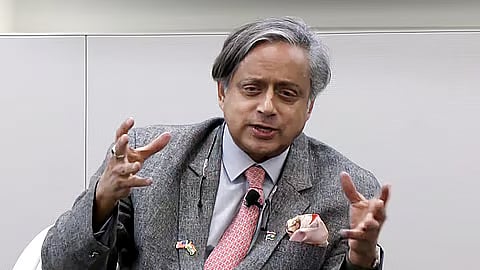Shashi Tharoor Highlights China's Influence in Pakistan's Military Strategy
Congress MP and former diplomat Shashi Tharoor has drawn attention to the significant role China plays in Pakistan’s military capabilities and its geopolitical posture. Speaking during a parliamentary delegation visit to the United States, Tharoor emphasized that 81% of Pakistan’s defence equipment is sourced from China, making Beijing an "impossible factor to ignore" in India’s ongoing conflict with Islamabad.
Addressing representatives of think tanks at the Indian Embassy in Washington DC, Tharoor said, “Defence may be the wrong word here. It’s offence in many ways... China is an absolutely impossible factor to ignore in what has been our confrontation with Pakistan.”
Tharoor, who is leading the Indian delegation in the aftermath of Operation Sindoor, stressed that while India seeks peace and open communication with its neighbors, recent developments — particularly China’s support to Pakistan — underscore emerging strategic threats.
“We are aware that China has immense stakes in Pakistan,” he added, referring to the China-Pakistan Economic Corridor (CPEC), the largest project under China’s Belt and Road Initiative (BRI). “Eighty-one percent of Pakistani defence equipment is from China — that tells you something,” Tharoor said.
India-China Relations Strained Again
Tharoor noted that India had witnessed “good progress” in relations with China following a period of tension after the 2020 Galwan Valley clashes. However, during the recent escalation with Pakistan, including India’s Operation Sindoor, a stark shift in China’s posture was observed.
“Even at the UN Security Council, we saw a different China,” Tharoor remarked. He criticized China’s backing of Pakistan, including its influence in omitting references to Pakistan-backed terror groups in the UNSC statement following the April 22 Pahalgam terror attack, which killed 26 people — mostly tourists.
The Security Council condemned the attack in “the strongest terms,” but failed to name The Resistance Front, reportedly due to Pakistan’s lobbying and China’s support.
Chinese Tech in Pakistan’s Military Strategy
During an earlier interaction at the Council on Foreign Relations, Tharoor responded to a question about Chinese military systems used by Pakistan. He noted that India had to adapt its strategy on the battlefield due to Pakistan’s use of sophisticated Chinese-supplied equipment — particularly integrated combat systems like the “kill chain,” where radar, GPS, aircraft, and missiles are interconnected for rapid response.
“We simply did things in a different way. Otherwise, we wouldn’t have been able to hit 11 Pakistani airfields or breach the Chinese-supplied air defences,” Tharoor said. He stressed that India recalibrated its strategy in real time during the conflict, allowing for decisive results.
India’s Balanced Approach
Despite the tensions, Tharoor reiterated India’s commitment to diplomacy and development.
“India has consistently chosen a path of keeping open channels of communication, even with our adversaries. Our trade with China remains at record levels,” he said, highlighting India’s dual focus on national security and economic growth.
The visit by the Indian parliamentary delegation aims to inform global stakeholders about Pakistan’s alleged terror nexus and the strategic complications arising from Chinese involvement in South Asia.

